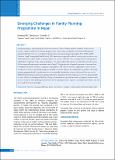Please use this identifier to cite or link to this item:
https://hdl.handle.net/20.500.14356/1920| Title: | Emerging Challenges in Family Planning Programme in Nepal |
| Authors: | Shrestha, D R Shrestha, A Ghimire, J |
| Citation: | ShresthaD. R., ShresthaA., & GhimireJ. (2012). Emerging Challenges in Family Planning Programme in Nepal. Journal of Nepal Health Research Council. https://doi.org/10.33314/jnhrc.v0i0.320 |
| Issue Date: | 2012 |
| Publisher: | Nepal Health Research Council |
| Article Type: | Special Issue Articles |
| Keywords: | Abortion Emerging challenges spousal separation Emergency contraception Family planning Nepal |
| Series/Report no.: | May-Aug, 2012;320 |
| Abstract: | Abstract Family planning is a priority program of the Government of Nepal. Despite political instability in the last two decades, Nepal has achieved remarkable progress in the overall status of reproductive health, including family planning. Married women of reproductive age have been increasingly using contraceptive from 1980s to2006. However, Nepal Demographic Health Survey 2011 has shown unexpected results on contraceptive prevalence rate. There had been a notable decline in the prevalence rate between 2006 and 2011, creating concerns among various stakeholders working in family planning programs. This paper analyzes this situation and identifies possible reasons for the stagnated contraceptive prevalence rate in Nepal. High proportion of spousal separation, an increased use of traditional methods, abortion, emergency contraception, and a lack of innovative approaches to cater services to difficult-to-reach or special sub-groups are possible reasons. To improve the contraceptive prevalence, the family planning program should be implemented more strategically. Further data analysis, initiation of best practices to fulfill family planning needs of special groups, functional integration of family planning services into general health services, effective counseling and behavior change communication to prevent unwanted pregnancies, and increased access to modern family planning methods could be the stepping stones to improve contraceptive prevalence rate and the overall FP program in Nepal.  Keywords: abortion; emerging challenges spousal separation; emergency contraception; family planning; Nepal. |
| Description: | Special Issue Articles |
| URI: | http://103.69.126.140:8080/handle/20.500.14356/1920 |
| ISSN: | Print ISSN: 1727-5482; Online ISSN: 1999-6217 |
| Appears in Collections: | Vol 10 No 2 Issue 21 May - Aug, 2012 |
Files in This Item:
| File | Description | Size | Format | |
|---|---|---|---|---|
| 320-Article Text-319-1-10-20130823.pdf | Fulltext Download | 566.53 kB | Adobe PDF |  View/Open |
Items in DSpace are protected by copyright, with all rights reserved, unless otherwise indicated.
